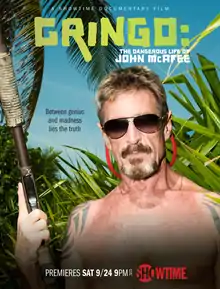Gringo: The Dangerous Life of John McAfee
Gringo: The Dangerous Life of John McAfee is a 2016 American documentary film about the portion of John McAfee's life spent in Belize. The film was directed by Nanette Burstein and had its world premiere at the Toronto International Film Festival on September 11, 2016, before airing on Showtime on September 24, 2016.[1]
| Gringo: The Dangerous Life of John McAfee | |
|---|---|
 Promotional poster | |
| Directed by | Nanette Burstein |
| Produced by | Chi-Young Park |
| Starring | John McAfee |
| Music by | Dana Kaproff |
| Cinematography | Robert Chappell |
| Edited by |
|
Production company | Ish Entertainment |
| Distributed by | Showtime |
Release date |
|
Running time | 97 minutes |
| Country | United States |
| Language | English |
Synopsis
McAfee became a multi-millionaire after creating a prominent antivirus software, and later relocated to Belize. In April 2012, national police raided McAfee's estate based on suspicions of drug manufacture or trafficking. Later that year McAfee's neighbor Greg Faull was murdered and McAfee went into hiding before crossing the border to Guatemala and being deported back to the United States. The documentary suggests that McAfee was involved in the murder due to a feud between him and Faull over McAfee's dogs. McAfee was never charged with any crime in Belize.[2][3]
McAfee described the documentary as fiction.[4]
Reception
John DeFore of The Hollywood Reporter praised the film, stating, "Though she says she began the documentary trying to understand how McAfee's likely guilt was so quickly forgotten by the media as they covered his latest political aspirations, Burstein seems to have wound up conducting an investigation more thorough, or at least more fruitful, than any local authority."[5] Jacob Brogan of Slate said of the film, "Even when Burstein's questions don't prompt easy answers, it's thrilling to consider the possibilities that arise in their wake",[6] while Steve Greene of IndieWire said, "This film works best as an indictment of a sensationalist, tunnel-vision brand of media coverage that confuses eccentricity for legitimacy and eschews reporting in favor of the face-value testimony of a strong personality."[7]
References
- Zelenko, Michael (September 12, 2016). "New Showtime documentary accuses John McAfee of rape and involvement in two murders". The Verge. Retrieved September 14, 2016.
- http://www.mercurynews.com/2016/09/20/john-mcafee-accused-of-rape-and-murder-in-scathing-showtime-documentary/
- http://www.thedailybeast.com/articles/2016/09/12/libertarian-presidential-hopeful-john-mcafee-accused-of-rape-and-murder-in-explosive-new-doc.html
- "John McAfee: Showtime's 'Gringo' Documentary Is Fiction". Bloomberg. Retrieved September 14, 2016.
- https://www.hollywoodreporter.com/review/gringo-dangerous-life-john-mcafee-928014
- http://www.slate.com/articles/arts/movies/2016/09/gringo_the_dangerous_life_of_john_mcafee_on_showtime_reviewed.html
- http://www.indiewire.com/2016/09/gringo-review-nanette-burstein-john-mcafee-tiff-2016-showtime-1201727362/